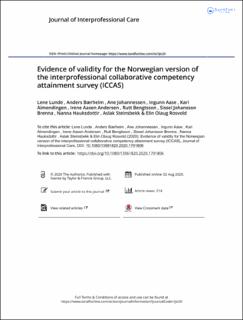| dc.contributor.author | Lunde, Lene | |
| dc.contributor.author | Baerheim, Anders | |
| dc.contributor.author | Johannessen, Ane | |
| dc.contributor.author | Aase, Ingunn | |
| dc.contributor.author | Almendingen, Kari | |
| dc.contributor.author | Andersen, Irene Aasen | |
| dc.contributor.author | Bengtsson, Rutt Venke | |
| dc.contributor.author | Brenna, Sissel Johansson | |
| dc.contributor.author | Hauksdottir, Nanna | |
| dc.contributor.author | Steinsbekk, Aslak | |
| dc.contributor.author | Rosvold, Elin Olaug | |
| dc.coverage.spatial | Norway | en_US |
| dc.date.accessioned | 2020-09-21T09:54:27Z | |
| dc.date.available | 2020-09-21T09:54:27Z | |
| dc.date.created | 2020-09-02T08:58:58Z | |
| dc.date.issued | 2020 | |
| dc.identifier.citation | Lunde, L., Bærheim, A., Johannessen, A., Aase, I., Almendingen, K., Andersen, I. A., … Rosvold, E. O. (2020). Evidence of validity for the Norwegian version of the interprofessional collaborative competency attainment survey (ICCAS). Journal of Interprofessional Care, 1–8. | en_US |
| dc.identifier.issn | 1356-1820 | |
| dc.identifier.uri | https://hdl.handle.net/11250/2678736 | |
| dc.description.abstract | This was a validation study of the Norwegian version of The Interprofessional Collaborative Competency Attainment Survey (ICCAS). ICCAS consists of 20 retrospective pre- and post-questions, where respondents rate their agreement with regard to self-assessed competencies after participating in interprofessional education courses. It has been validated across various settings. The questionnaire was translated using the back-translation technique. We investigated evidence of validity regarding content, response process, and internal structure. Data were obtained from health and social care students (n = 1440, response rate 42.8%) participating in 12 different interprofessional courses in seven education institutions in Norway using a cross-sectional design. Exploratory factor analysis indicated one retracted factor for pre-scores and one retracted factor for post-scores. High McDonald’s omega values indicated good internal consistency. Item deletion did not improve the scale’s overall consistency on pre- or post-scores. We observed higher mean post-scores than pre-scores with moderate-to-large effect sizes, indicating a positive change in self-assessed interprofessional capabilities after training. Our findings indicate that the Norwegian version of ICCAS is a valid tool that may be implemented across a wide range of interprofessional education courses. Finally, our findings support earlier recommendations that ICCAS should be analyzed at an overall level to address change in interprofessional capabilities. | en_US |
| dc.language.iso | eng | en_US |
| dc.publisher | Taylor & Francis | en_US |
| dc.rights | Navngivelse 4.0 Internasjonal | * |
| dc.rights.uri | http://creativecommons.org/licenses/by/4.0/deed.no | * |
| dc.subject | interprofessional education | en_US |
| dc.subject | student assessment | en_US |
| dc.subject | instrument validation | en_US |
| dc.subject | ICCAS | en_US |
| dc.title | Evidence of validity for the Norwegian version of the interprofessional collaborative competency attainment survey (ICCAS) | en_US |
| dc.type | Peer reviewed | en_US |
| dc.type | Journal article | en_US |
| dc.description.version | publishedVersion | en_US |
| dc.rights.holder | © 2020 The Author(s) | en_US |
| dc.subject.nsi | VDP::Samfunnsvitenskap: 200::Pedagogiske fag: 280 | en_US |
| dc.subject.nsi | VDP::Medisinske Fag: 700::Helsefag: 800 | en_US |
| dc.source.journal | Journal of Interprofessional Care | en_US |
| dc.identifier.doi | 10.1080/13561820.2020.1791806 | |
| dc.identifier.cristin | 1826628 | |
| cristin.ispublished | true | |
| cristin.fulltext | original | |
| cristin.qualitycode | 1 | |

